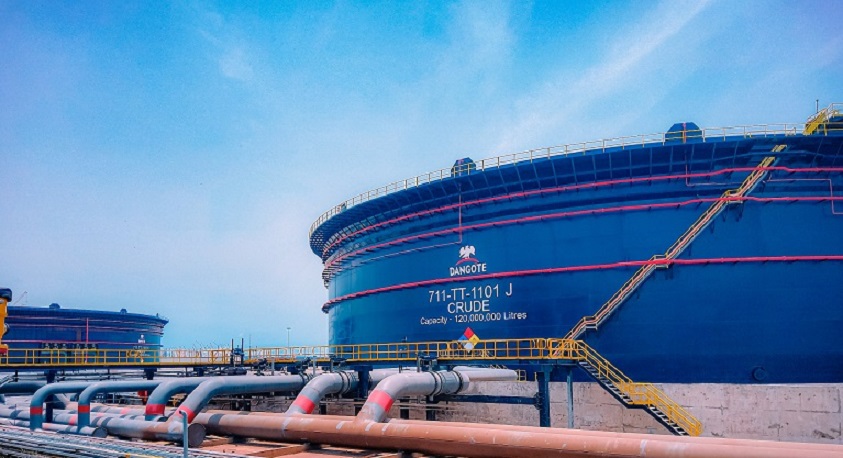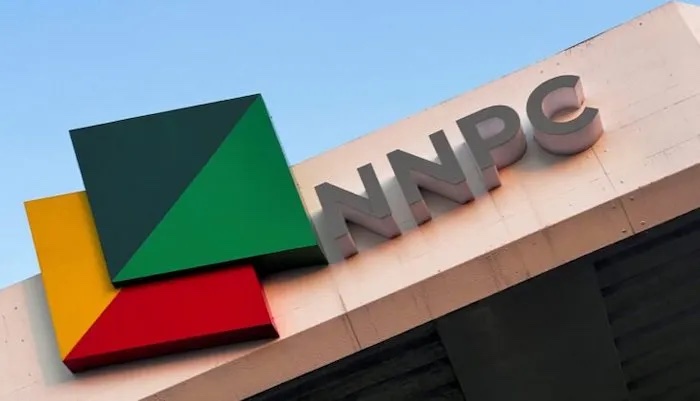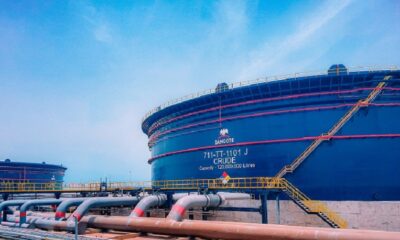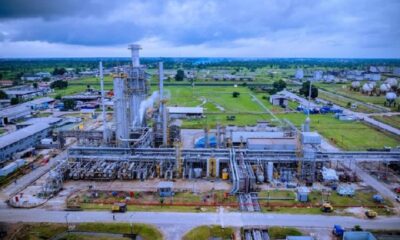Business
Deregulation, Not License For Off-spec Products Blending – Dangote Refinery

The Dangote Petroleum Refinery and Petrochemicals is of the view that deregulation should not be used as a justification for the importation of off-spec petroleum products or the undermining of Nigeria’s national interests.
This was contained in a statement on Tuesday by Dangote’s Group Chief Branding and Communications Officer, Anthony Chiejina.
The counsel came in response to remarks by Chief Executive Officer of Pinnacle Oil and Gas Limited, Robert Dickerman, on the importation and blending of petroleum products, which he framed within the context of a “deregulated commodity market.”
However, the Dangote Petroleum Refinery is of the view that his argument for a deregulated market could not obscure the serious implications of his actions, which, it claimed, not only threatened the integrity of Nigeria’s energy sector but also endangered the welfare of its citizens.
While reiterating support for deregulation and industrialisation, the Dangote Refinery emphasised that the support must be grounded in a commitment to the sustainable growth of Nigeria’s economy, while shielding the people from exploitation.
The refinery made it clear that the health and safety of Nigerians should never be compromised in the pursuit of profit.
According to the statement, “The Dangote Petroleum Refinery and Petrochemicals Company has long been an advocate for deregulation and industrialisation in Nigeria, but our support is rooted in a commitment to the sustainable growth of the country’s economy and the protection of its people from any exploitation. Unlike Dickerman’s view, deregulation should not be a licence for the importation and distribution of off-spec products or the subversion of national interests.”
The company also noted that, as an American, Dickerman should be well aware of how his own country protects its industries. It pointed to several recent examples from the United States to underline the point.
For instance, U.S. President Joe Biden recently opposed the sale of U.S. Steel to Japan’s Nippon Steel, stressing the importance of maintaining strong American steel companies supported by American workers — an example of protectionism that prioritises national economic interests over short-term profit.
Similarly, the U.S. has taken action to restrict the use of Chinese-made cranes in its ports, citing national security concerns. The U.S. has also imposed a 100% tariff on electric vehicles and a 50% duty on medical equipment imported from China, further demonstrating its commitment to safeguarding domestic industries.
The U.S. has also ramped up efforts to boost its own production of computer chips and medical supplies, driven by national security concerns and the need for economic self-sufficiency. Furthermore, during his presidency, George W. Bush used anti-dumping laws to impose tariffs on a range of Chinese goods that were considered to be unfairly priced.
“It is therefore perplexing that Dickerman, with all his experience in the U.S. market, would advocate for the importation and blending of petroleum products to Nigeria under the claim of deregulation and a free market. The fact is that he had deceitfully approached us and pleaded that we extend the pipeline from our refinery to Pinnacle’s tank farms for the purpose of blending our high-quality products with their imported products and selling them to Nigerians. We categorically rejected his request to extend our pipeline to their tank farms for such devious purposes because it would be a betrayal of the Nigerian people’s trust. The health and safety of Nigerians cannot—and should not—be compromised for profit,” the statement added.
The company also raised concerns over Pinnacle Oil’s decision to lease its tank farms to a company without any retail outlets in Nigeria, questioning the strategic intent behind such actions, particularly given that the farms are located just 500 metres from Dangote’s refinery.
It expressed its vigilance regarding the coordinated efforts to undermine the Dangote Refinery, drawing parallels to the fate of refineries in Port Harcourt, Kaduna, and Warri.
Consequently, the Dangote Petroleum Refinery called on the government, patriotic Nigerians, and local businesses to remain steadfast in defending the country’s sovereignty and economic independence.
“The choice we face is between fostering industrialisation or allowing Nigeria to remain a dumping ground for inferior products while exporting jobs. For nearly three decades, cartels and their collaborators have sabotaged efforts to develop Nigeria’s refining capacity, keeping the country dependent on imported products. The time has come to end this cycle of exploitation and ensure that Nigeria’s energy sector works for the benefit of its people,” it added.
Reiterating belief that a strong, self-sufficient energy sector is vital for Nigeria’s economic growth, the Dangote Refinery affirmed that it will continue to advocate for policies and practices that protect both industries and the well-being of all Nigerians.
The company also expressed its support for healthy competition that drives innovation and quality, and looked forward to the upcoming commissioning of the four state-owned refineries, as promised by the NNPC Ltd.
“At Dangote Petroleum Refinery, we are committed to ensuring that Nigeria becomes self-reliant in petroleum production, and we welcome competition that drives innovation and quality. However, we will never allow the continued importation and blending of petroleum products, nor the deliberate destruction of our national economy. We believe that a strong, self-sufficient energy sector is vital to Nigeria’s economic growth, and we will continue to advocate for policies and practices that protect our industries and the well-being of all Nigerians.
“We eagerly anticipate the coming on stream of the Kaduna, Warri, and Port Harcourt refineries before the end of this year, as promised by the Group Chief Executive Officer (GCEO) of NNPCL, Mele Kyari. This milestone will not only end all baseless rumours of monopoly but also position Nigeria as a refining hub for petroleum products in Africa,” it concluded.
Business
World Bank Appoints Aliko Dangote To Elite Group

The President and Chief Executive of the Dangote Group, Alh Aliko Dangote, has been appointed to the World Bank’s Private Sector Investment Lab.
Biztellers reports that his see the business mogul joining a select group of global business leaders tasked with driving investment and job creation in emerging economies.
The development was revealed in a statement in which he confirmed his acceptance, where the African industrialist reaffirmed his commitment to fostering sustainable economic growth through private sector-led investment, noting the transformative potential of such initiatives in developing markets.
“I am both honoured and excited to accept my appointment to the World Bank’s Private Sector Investment Lab, dedicated to advancing investment and employment in emerging economies,” Dangote said.
ALSO READ: Ministry Appoints New Director For DUFUTH, Uburu
“This opportunity aligns with my long-standing commitment to sustainable development and unlocking the potential of developing economies. Drawing inspiration from the remarkable successes of the Asian Tigers, which have demonstrated the power of strategic investment and focused economic policy, I am eager to collaborate with fellow leaders to replicate such outcomes across other regions.”
The Dangote Group, founded by Aliko Dangote, is the largest conglomerate in West Africa and one of the largest on the African continent. With interests spanning cement, fertiliser, salt, sugar, and oil, the Group employs over 30,000 people and is the largest taxpayer in Nigeria—contributing more in taxes than all of Nigeria’s banks combined. It is also the country’s largest employer after the government.
The $20 billion Dangote Petroleum Refinery & Petrochemicals, the Group’s flagship project, stands as the largest single private investment in Africa.
In addition to his business interests, Dangote leads the Aliko Dangote Foundation (ADF), the largest private foundation in sub-Saharan Africa, with the largest endowment by a single African donor. The Foundation primarily focuses on child nutrition, while also supporting interventions in health, education, empowerment, and disaster relief.
The World Bank announced Dangote’s appointment on Wednesday as part of a broader expansion of its Private Sector Investment Lab, which now enters a new phase aimed at scaling up solutions to attract private capital and create jobs in the developing world.
Joining Dangote in the elite group are Bill Anderson, CEO of Bayer AG; Sunil Bharti Mittal, Chair of Bharti Enterprises; and Mark Hoplamazian, President and CEO of Hyatt Hotels Corporation.
The World Bank said the expanded membership brings together business leaders with proven track records in generating employment in developing economies—supporting the Bank’s sharpened focus on job creation as a central pillar of global development.
“With the expanded membership, we are mainstreaming this work across our operations and tying it directly to the jobs agenda that is driving our strategy,” said World Bank Group President Ajay Banga. “This isn’t about altruism—it’s about helping the private sector see a path to investments that will deliver returns, and lift people and economies alike. It’s central to our mandate.”
The global bank said that over the last 18 months, the Lab brought together leaders from global financial institutions to identify the most pressing barriers to private sector investment in developing countries and to test actionable solutions.
The statement said that the work had now been consolidated into five priority focus areas that were being integrated across the bank operations, including regulatory and policy certainty.
The Lab’s founding members included senior executives from AXA, BlackRock, HSBC, Macquarie, Mitsubishi UFJ Financial Group, Ninety-One, Ping An Group, Royal Philips, Standard Bank, Standard Chartered, Sustainable Energy for All, Tata Sons, Temasek, and Three Cairns Group. The Lab is chaired by Shriti Vadera, Chair of Prudential plc.
Business
Trade Tensions Hit Nokia As Q1 Ends In €68M Loss
Nokia has reported a net loss of €68 million for the first quarter of 2025, a sharp decline from the €438 million profit recorded during the same period last year.
The Finnish telecoms equipment maker attributed the downturn to global trade disruptions and recently imposed tariffs by the United States.
The company’s net sales dropped slightly to €4.4 billion, down by one percent year-on-year.
READ ALSO: Trade War: China Strikes Back Wth 125% Tariffs On U.S. Goods
Tariff-related challenges were highlighted by Nokia’s President and CEO, Justin Hotard, who acknowledged the broader economic pressures affecting the industry.
“We are not immune to the rapidly evolving global trade landscape,” Hotard stated. “However, based on early customer feedback, I believe our markets should prove to be relatively resilient.”
He also noted the potential short-term financial impact, saying, “Based on what we see today, we currently expect a EUR 20 to 30 million impact on our comparable operating profit in the second quarter from the current tariffs.”
Earlier this month, U.S. President Donald Trump introduced a 10 percent tariff on global imports, while pausing plans for steeper duties, including a proposed 20 percent levy on products from the European Union.
Despite the quarterly setback, Nokia expressed confidence in its growth prospects.
The company is looking to its Network Infrastructure, Cloud and Network Services, and Mobile Networks divisions to drive sales in the year ahead.
In a sign of continued momentum in the mobile segment, Nokia also announced on Thursday that it had extended its contract with T-Mobile US.
The company said it is continuing “to see positive signs of stabilization” in Mobile Networks.
Business
Marketers In Anguish, As Dangote, NNPC Ltd War Drag Price To N880/litre

The pull of market forces which moved the hands of the Nigerian National Petroleum Company Limited (NNPC Ltd) to reduce the price of Premium Motor Spirit (petrol) to N880 per litre in Lagos and N935 in Abuja appears to be a source of torture to independent markets.
Biztellers reports that the latest price review on Easter Monday saw NNPC retail outlets in Lagos drop from N925 to N880, while those in Abuja adjusted from N950 to N935.
The NNPC Ltd’s price reduction came barely a week after the Dangote Refinery lowered its ex-depot price from N865 to N835 per litre.
ALSO READ: BREAKING: Again, Dangote Cuts Petrol Price To N835 per Litre
In addition, the $20bn refinery also directed its partners like MRS, Heyden, and Ardova to sell a litre of petrol at the rate of N890 instead of N920 in Lagos, N900 in the South West, N910 in the South-South, and N920 in the North East.
Consumers can smile because with the reaction, the NNPC Ltd’s new price in Lagos is N10 lower than what the Dangote Refinery is selling at, which might lead to another reaction, as the price war between the two companies.
Though some NNPC Ltd’s retail outlets were observed selling at the old rate in Lagos, it was gathered that they were given the liberty to exhaust old stock before adjusting to the new prices.
Market sources are of the view that the current price war was ignited by the Federal Government’s implementation of the Naira-for-crude policy.























